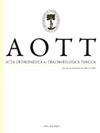土耳其骨科住院医师辞职的原因:从住院医师角度进行的横断面调查
IF 1.1
4区 医学
Q3 ORTHOPEDICS
引用次数: 2
摘要
目的:本研究的目的是分析导致土耳其骨科和创伤科住院医师辞职的因素,并确定骨科和创伤学住院医师的总体辞职率。方法:在这项横断面调查中,纳入了2013年秋季至2020年春季期间辞职或转到其他OT诊所的120名居民。他们被要求填写一份通过WhatsApp应用程序或电子邮件发送的问卷。提问者由两部分组成;涉及辞职的A部分由15个问题组成,涉及转到另一个OT项目的B部分由12个问题组成。两个部分都有开放式和多项选择题。结果:根据我们的审查,在120名住院患者中,96人(6.6%)辞职后转到另一个专科,24人(1.6%)转到另一家骨科和创伤科诊所。2013年至2020年,根据骨科和创伤科住院总配额,总体辞职率为8.2%。在符合调查条件的120名骨科和创伤科住院医师中,83人(70%)完成了问卷调查。六十一(60名男性,1名女性;中位年龄 = 26年;年龄范围 = 25-35)完成了A区(应答率为63.5%);22(22名男性;中位年龄 = 27.6岁;年龄范围 = 在转到另一家骨科和创伤科诊所的24名居民中,有25-34人完成了B区(应答率为91.6%)。在A区,61人中有40人(65.5%)首选骨科和创伤专业作为TUS的首选,34名居民(55.7%)报告说,在开始诊所之前,他们没有足够的住院计划信息。在B部分,在22名住院医师中,13人(59%)表示,整形外科和创伤科住院医师不是他们在TUS的首选,18人(81.8%)表示对首选诊所没有足够的了解。辞职或转到其他专业的最常见原因是工作量大(n = 46,74.19%),其次是工作时间过长(n = 转到其他骨科和创伤科诊所的最常见原因是繁重的工作(n = 10,45.5%),其次是骨科和创伤科住院医师的等级问题(n = 40.9%)。结论:本次调查的结果表明,根据2013年至2020年OT居留权的总配额,总体辞职率为8.2%,从OT居留权辞职是土耳其的一个重要问题。工作量大和工作时间过长是骨科住院医师辞职的最常见原因。此外,转移居民实际工作职责的额外工作,以及学术和教育问题,是导致转移到另一个OT住院项目的主要因素。本文章由计算机程序翻译,如有差异,请以英文原文为准。
Reasons for resident resignations from Orthopedic Residency Programs in Turkey: A cross-sectional survey from residents’ perspectives
Objective: The aim of this study was to analyse the factors that led to resignations from Orthopaedics and Traumatology Residency programmes in Turkey, and to determine the overall rate of resignation among residents from Orthopaedics and Traumatology programmes. Methods: In this cross-sectional survey,120 residents who either resigned or transferred to other OT clinics between autumn of 2013 and spring of 2020 were included. They were asked to complete a questionnare which was sent via Whatssapp application or e-mail. The questionnare was comprised of 2 sections; Section A, which adressed resignation, consisted of 15 questions and Section B, which adressed transfer to another OT programme, consisted of 12 questions. Both sections had open ended and multiple choice questions. Results: Of 120 residents, 96 (6.6%) resigned and then transferred to another specialty, and 24 (1.6%) transferred to another orthopedics and traumatology clinic based on our review. The overall resignation rate as per the total quotas for orthopedics and traumatology residency from 2013 to 2020 was 8.2%. Of the 120 orthopedics and traumatology residents who were eligible for the survey, 83 (70%) completed the questionnaire. Sixty-one (60 males, 1 female; median age = 26 years; age range = 25-35) of 96 residents who resigned from the orthopedics and traumatology residency completed section A (the response rate was 63.5%); 22 (22 males; median age = 27.6 years; age range = 25-34) out of 24 residents who transferred to another orthopedics and traumatology clinic completed section B (the response rate was 91.6%). In section A, 40 out of 61 individuals (65.5%) preferred orthopedics and traumatology specialty as the first choice in TUS, and 34 residents (55.7%) reported not to have had enough information regarding the residency program before starting their clinics. In section B, out of the 22 residents, 13 (59%) stated that orthopedics and traumatology residency was not their first choice in TUS, and 18 (81.8%) reported not to have had sufficient knowledge about the preferred clinic. The most common reason for resignation or transfer to another specialty was heavy workload (n = 46, 74.19%), followed by excessive hours of work (n = 45, 72.58%). The most common reason for transfer to another orthopedics and traumatology clinic was drudgery (n = 10, 45.5%), followed by problems with the hierarchy in orthopedics and traumatology residency (n = 9, 40.9%). Conclusion: The results of this survey have shown us, with an overall resignation rate of 8.2% as per the total quotas for OT residency from 2013 to 2020, that resignation from OT residency represents an important problem in Turkey. Workload and excessive hours of work were the most common reasons for resignation from orthopaedic residency programmes. Furthermore, extra work that diverted residents from their actual job responsibilities, as well as academic and educational concerns, were the main factors leading to transfer to another OT residency programme.
求助全文
通过发布文献求助,成功后即可免费获取论文全文。
去求助
来源期刊

Acta orthopaedica et traumatologica turcica
ORTHOPEDICS-
CiteScore
2.00
自引率
0.00%
发文量
66
审稿时长
>12 weeks
期刊介绍:
Acta Orthopaedica et Traumatologica Turcica (AOTT) is an international, scientific, open access periodical published in accordance with independent, unbiased, and double-blinded peer-review principles. The journal is the official publication of the Turkish Association of Orthopaedics and Traumatology, and Turkish Society of Orthopaedics and Traumatology. It is published bimonthly in January, March, May, July, September, and November. The publication language of the journal is English.
The aim of the journal is to publish original studies of the highest scientific and clinical value in orthopedics, traumatology, and related disciplines. The scope of the journal includes but not limited to diagnostic, treatment, and prevention methods related to orthopedics and traumatology. Acta Orthopaedica et Traumatologica Turcica publishes clinical and basic research articles, case reports, personal clinical and technical notes, systematic reviews and meta-analyses and letters to the Editor. Proceedings of scientific meetings are also considered for publication.
The target audience of the journal includes healthcare professionals, physicians, and researchers who are interested or working in orthopedics and traumatology field, and related disciplines.
 求助内容:
求助内容: 应助结果提醒方式:
应助结果提醒方式:


